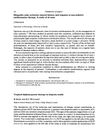 71 citations,
May 1991 in “Clinical and Experimental Dermatology”
71 citations,
May 1991 in “Clinical and Experimental Dermatology” Young men with male pattern baldness lose hair density over time without treatment.
 11 citations,
January 1995 in “Biomedicine & pharmacotherapy”
11 citations,
January 1995 in “Biomedicine & pharmacotherapy” TURP is the best treatment for BPH, but some patients prefer medications like alpha-blockers and finasteride.
 24 citations,
January 1993 in “Dermatologic Clinics”
24 citations,
January 1993 in “Dermatologic Clinics” Minoxidil effectively treats hair loss, works better for women, and requires consistent use.
 July 2023 in “JAAD International”
July 2023 in “JAAD International” Two drugs, finasteride and minoxidil, are approved for hair loss treatment, but new therapies are being developed.
 October 2024 in “JEADV Clinical Practice”
October 2024 in “JEADV Clinical Practice” UK dermatologists commonly use corticosteroids and minoxidil to treat hair loss conditions.
 33 citations,
January 2002
33 citations,
January 2002 Latanoprost, a glaucoma drug, showed potential for promoting hair growth in bald monkeys, especially at higher doses.
 July 2023 in “Journal of Cutaneous and Aesthetic Surgery”
July 2023 in “Journal of Cutaneous and Aesthetic Surgery” Combining platelet-rich plasma with other treatments may improve hair growth in people with hair loss, but more research is needed.
 20 citations,
August 1987 in “Journal of steroid biochemistry/Journal of Steroid Biochemistry”
20 citations,
August 1987 in “Journal of steroid biochemistry/Journal of Steroid Biochemistry” Aldactone was more effective in reducing hair growth in women with hirsutism than Diane, despite having less impact on hormone levels.
 176 citations,
August 2000 in “The Journal of clinical endocrinology and metabolism/Journal of clinical endocrinology & metabolism”
176 citations,
August 2000 in “The Journal of clinical endocrinology and metabolism/Journal of clinical endocrinology & metabolism” Hormone treatments in transsexual individuals reduce hair growth and oil production in male-to-females and increase them in female-to-males.
 11 citations,
January 2016 in “Bipolar Disorder”
11 citations,
January 2016 in “Bipolar Disorder” Valproate is a mood stabilizer for bipolar disorder but has side effects and risks, especially during pregnancy.
 3 citations,
April 2021 in “Journal of Medicinal Chemistry”
3 citations,
April 2021 in “Journal of Medicinal Chemistry” Finasteride may affect PNMT, causing side effects.
 10 citations,
June 2011 in “Archives of Dermatology”
10 citations,
June 2011 in “Archives of Dermatology” Finasteride caused blisters on hands and feet.
 22 citations,
March 2018 in “American Journal of Clinical Dermatology”
22 citations,
March 2018 in “American Journal of Clinical Dermatology” New acne treatments show promise as alternatives to traditional therapies.
March 2023 in “Clinical, Cosmetic and Investigational Dermatology” Spironolactone can effectively treat hair loss with manageable side effects.
 27 citations,
January 2013 in “Indian Journal of Dermatology, Venereology and Leprology”
27 citations,
January 2013 in “Indian Journal of Dermatology, Venereology and Leprology” PCOS is a complex disorder managed by treating symptoms and requires a team of specialists.
 37 citations,
January 2009 in “Dermatology”
37 citations,
January 2009 in “Dermatology” Healthy women tend to lose more hair in July and April, and the least in February.
January 2023 in “Pharmaceutics” AA–TF#15 significantly promotes hair regrowth and could be an effective treatment for androgenic alopecia.

Male androgenetic alopecia (MAA) is a common, hereditary hair loss condition in men, linked to heart disease, and can be treated with minoxidil, finasteride, or hair transplantation.
 14 citations,
January 2008 in “Dermatology Online Journal”
14 citations,
January 2008 in “Dermatology Online Journal” Hormonal therapies like cyproterone acetate and spironolactone may help some women with hair loss, but finasteride 1mg is not useful, and the effectiveness of other treatments is still unclear.

Spironolactone with an oral contraceptive improved hair growth in women with hirsutism.
 1 citations,
January 2015 in “Springer eBooks”
1 citations,
January 2015 in “Springer eBooks” AGA is a common hair loss disorder, and early diagnosis and treatment with minoxidil or finasteride can help reduce emotional distress.
January 2019 in “Journal of Cosmetics, Dermatological Sciences and Applications” The combination therapy is safe and effective for treating Female Pattern Hair Loss in Asian women.
 17 citations,
January 1986 in “Acta obstetricia et gynecologica Scandinavica”
17 citations,
January 1986 in “Acta obstetricia et gynecologica Scandinavica” Spironolactone can reduce hair growth and testosterone in hirsutism, but is less effective than combined treatments.
 21 citations,
July 2018 in “The Journal of Sexual Medicine”
21 citations,
July 2018 in “The Journal of Sexual Medicine” The 2018 update to the ED care model added a new severity score and stressed a detailed evaluation of both physical and psychological aspects.
 22 citations,
January 2002 in “Treatments in endocrinology”
22 citations,
January 2002 in “Treatments in endocrinology” Birth control pills help treat skin and hair growth problems linked to high male hormone levels.
 5 citations,
July 1988 in “British journal of dermatology/British journal of dermatology, Supplement”
5 citations,
July 1988 in “British journal of dermatology/British journal of dermatology, Supplement” Diphencyprone therapy can effectively treat severe hair loss in motivated patients.
 April 2011 in “Global journal of health science”
April 2011 in “Global journal of health science” Spironolactone effectively makes hair shafts thinner in women with excessive hair growth.
 6 citations,
October 2005 in “Indian Journal of Dermatology”
6 citations,
October 2005 in “Indian Journal of Dermatology” The document discusses male and female pattern hair loss, its diagnosis methods, FDA-approved treatments like finasteride and minoxidil, their side effects, and the role of lifestyle changes.
 3 citations,
January 2018
3 citations,
January 2018 Amla oil may help treat hair loss.
 9 citations,
July 2017 in “Case Reports in Dermatology”
9 citations,
July 2017 in “Case Reports in Dermatology” Combination therapy helped patient with advanced Hidradenitis Suppurativa achieve remission.



























